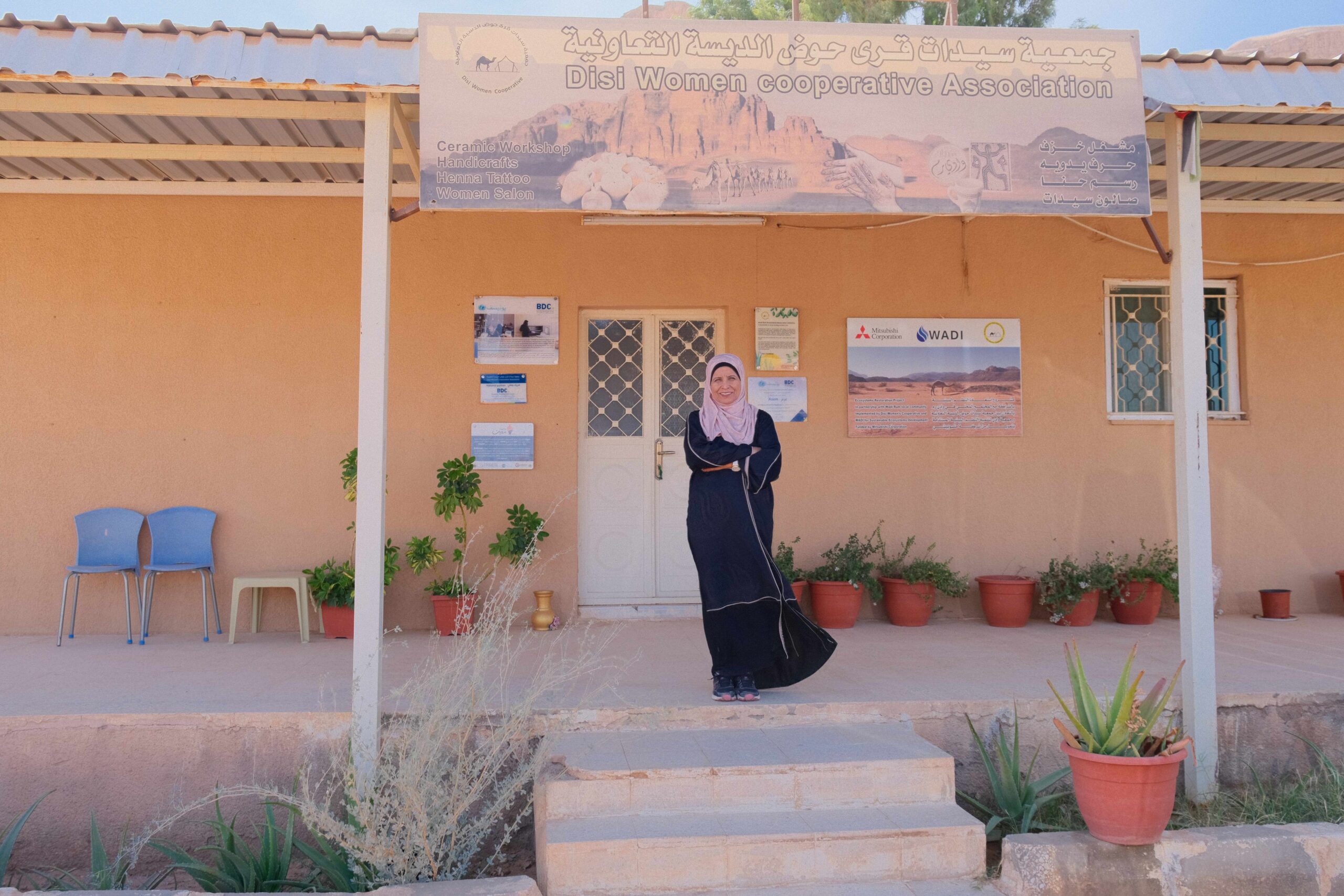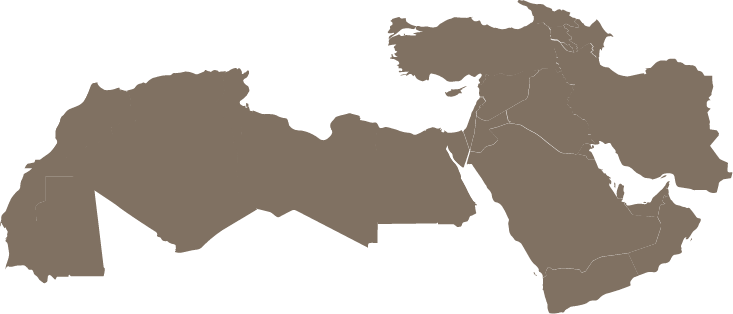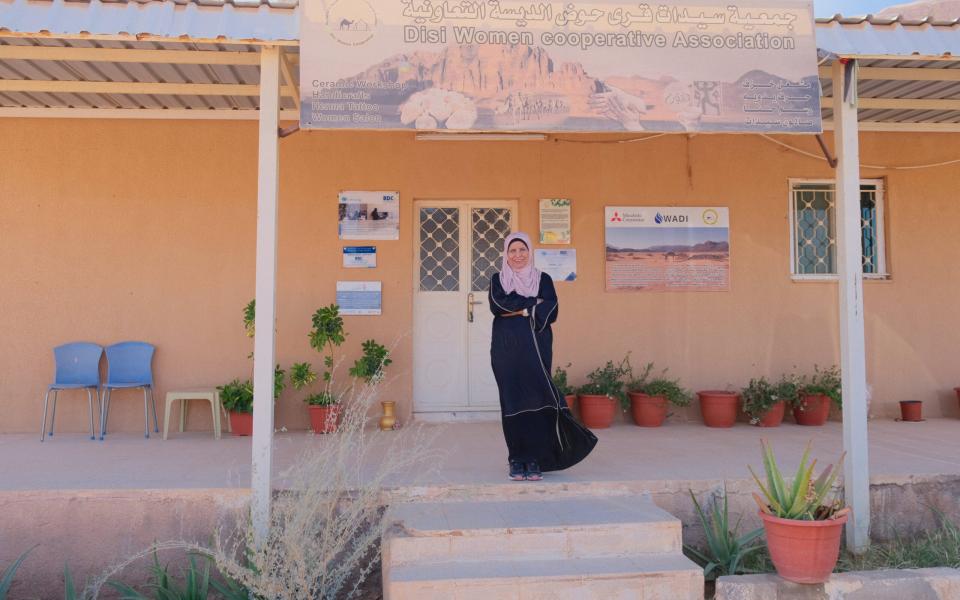
In the heart of Wadi Rum, a breathtaking desert landscape in southern Jordan known for its vast red sands, towering cliffs, and ancient petroglyphs, lies the small village of Al-Disah.
It is here that I meet Qutnah, also known as Umm Laith (mother of Laith), a remarkable Bedouin woman whose vision and determination have transformed not only her own life but also the lives of countless women in her community. Her journey is one of resilience, hard work, and an unwavering belief in the power of women to create change.
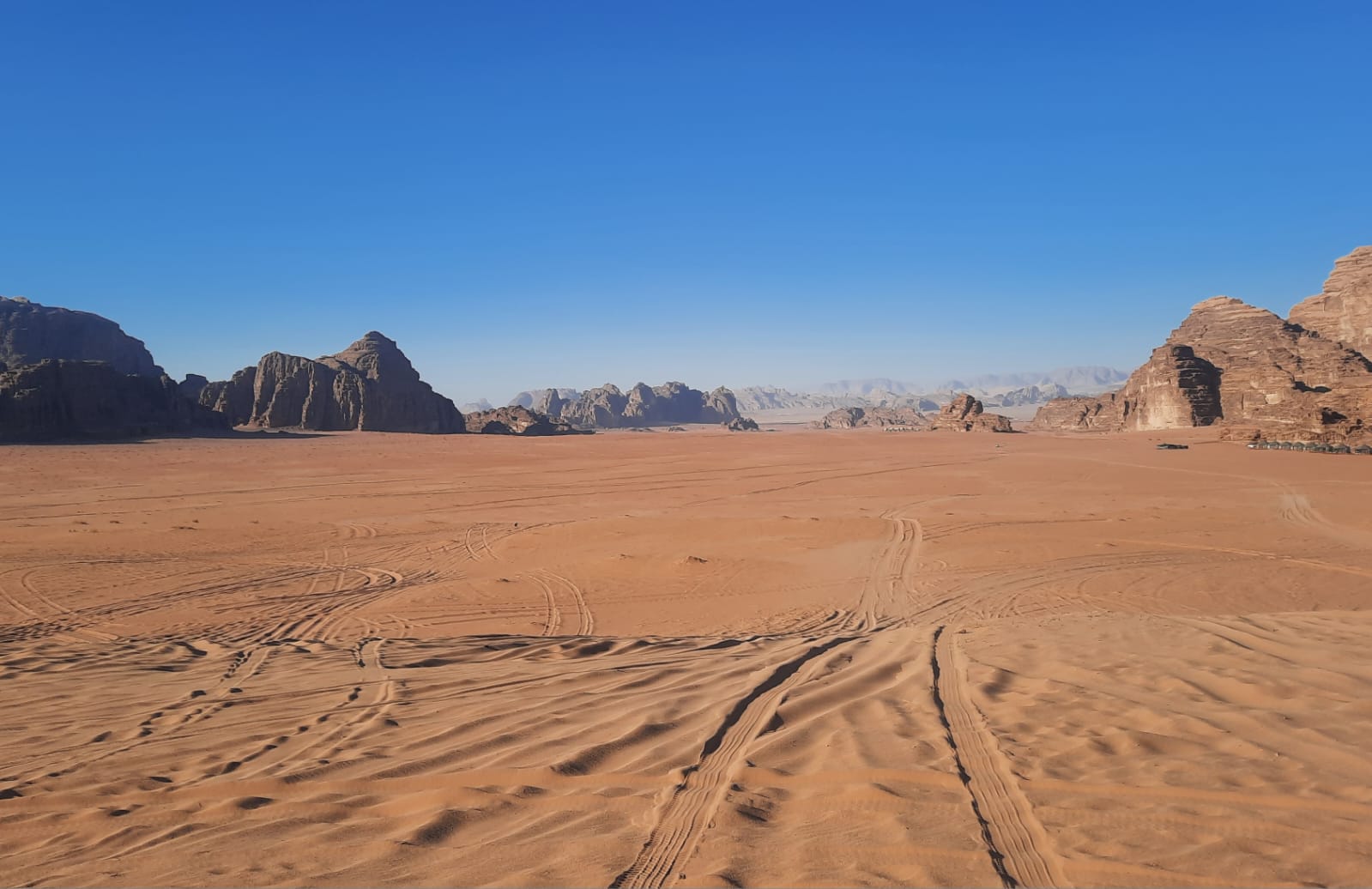
Arriving at the Disi Women’s Association
The association she leads is buzzing with activity when I arrive. Women are bustling around, preparing rooms for the arrival of guests. These days a camel race is taking place in Wadi Rum, and Qutnah is preparing to meet visitors from Saudi Arabia later. Despite her packed day, she has graciously set aside time for our conversation.
At the entrance, an impressive shop displays the fruits of the women’s labour – beautifully crafted jewellery, embroidered belts, pottery, and other handmade treasures. Each piece reflects the culture, creativity, and resilience of the women who made them.
We sit together with the women for a delicious breakfast of Bedouin tea, freshly baked bread, fried tomatoes, and olives from Qutnah’s garden. Paintings on the walls depict scenes from Bedouin tales, adding to the warm and welcoming atmosphere. I am struck by the kindness and hospitality they so generously offer.
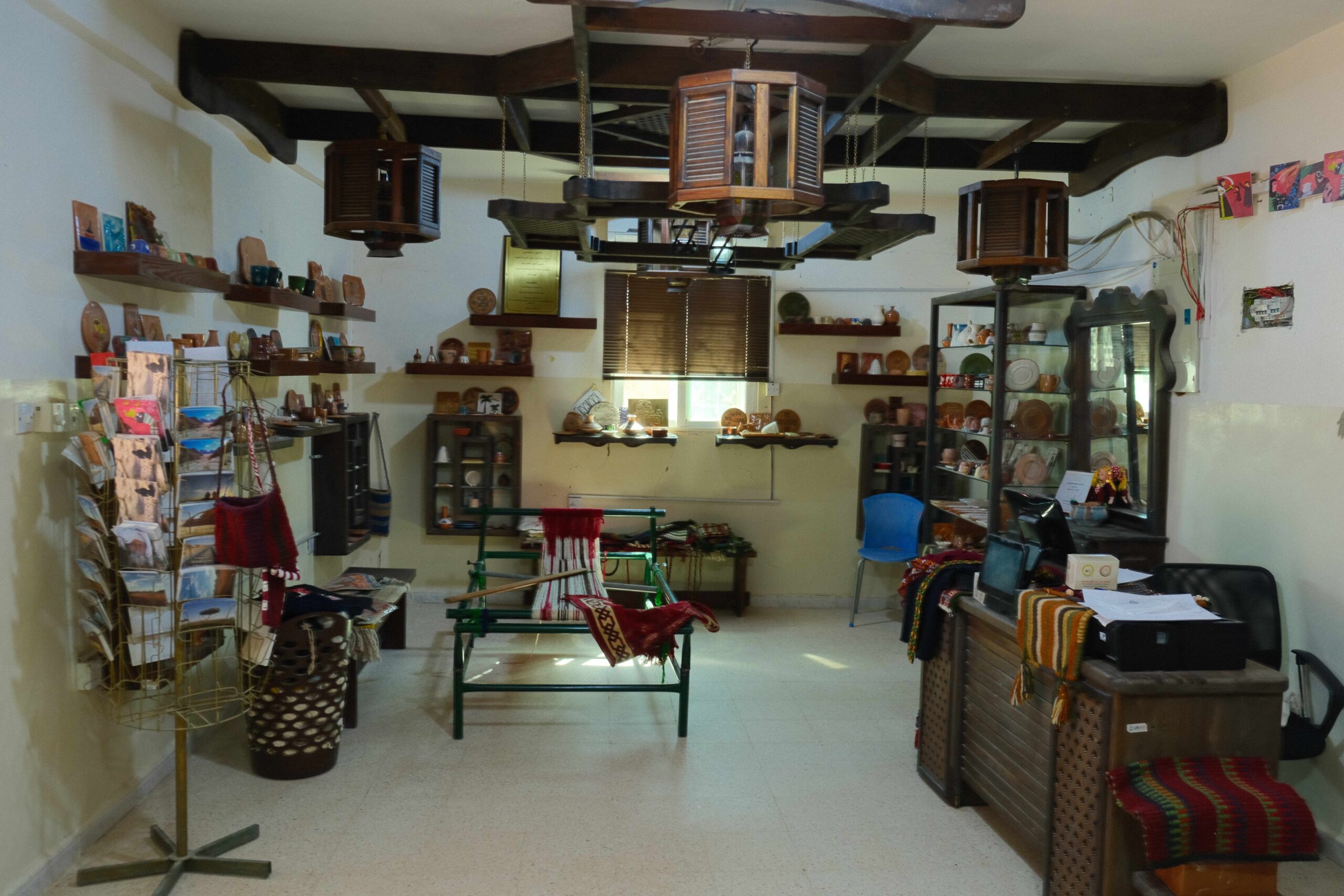
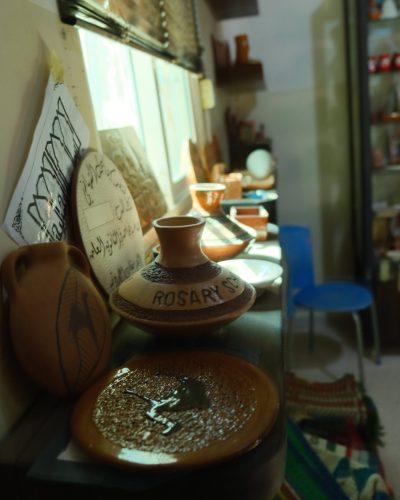
The First Woman
After breakfast, we retreat to a quieter room filled with sewing machines, where we begin our conversation.
Qutnah, a 60-year-old woman, is originally from Wadi Rum village. Married and a mother of eight children, she is a pioneer in many ways. She was the first woman from Wadi Rum to enrol in university and serve in the military, breaking barriers of what is possible for Bedouin women. In 2010, she also became the first woman in southern Jordan to establish an association, the Disi Women’s Association, which is now a Cooperation Circle of URI MENA.
“I see myself as a mother not only to my children but to the women of my community,” she shares. She finds happiness in helping them and their families.
Qutnah asks me, whether I want to hear about the process of founding her association. Of course, I do!
After completing her military service, Qutnah contemplated how she could help the unemployed and impoverished women in her region. Life for Bedouin women is particularly challenging – not only is finding work difficult in Jordan, but cultural traditions often discourage them from working outside their homes or villages. This leaves many at a social and financial disadvantage. Determined to make a change, Qutnah decided to act.
Before the association existed, there was no space in Al-Disah or Wadi Rum for women to gather. So, at first, Qutnah opened her own home to host women from her village and neighbouring areas. In 2010, she officially founded the Disi Women’s Association, a place where women could meet, learn new skills, and support one another. Initially, the membership fee was 250 Jordanian dinars (JD). Today it is 310 JD – a one-time payment that can be made in instalments for women who need it.
Starting the association wasn’t easy. Many traditional Bedouin families did not approve of women meeting outside their homes. The association’s first building was in rough condition – it lacked windows and doors and was even used by animals for shelter. But Qutnah didn’t give up. With the support of a manager from ASEZA (Aqaba Special Economic Zone Authority), she was able to finish the building.
Empowering Women through Craft
The association’s initial focus was on teaching women handicrafts, such as pottery, which they could sell to tourists. The first training session involved 12 women, who were taught pottery skills and how to train others in the community to serve as multipliers. Over time, Qutnah expanded the scope of the association, enabling women to work on projects from the comfort of their homes, staying in line with the traditions of Bedouin families.
She submitted proposals to the government to fund small projects for women, including jewellery-making, pottery, and agricultural ventures, such as raising chickens for egg production. Some even explored opportunities in camel tourism. Women could present their project ideas to the association and receive interest-free loans ranging from 500 to 2,000 JD. Qutnah personally checked on each project’s progress monthly.
Over the years, the association has received support from various organizations. For example, the association was supported by the Queen Rania Foundation, which provided sewing machines for 40 women. These machines were distributed to the trainees after they completed their sewing training, enabling them to start their own home-based projects and earn a sustainable income. Despite cultural traditions discouraging women’s involvement in tourism, Qutnah introduced activities like storytelling, traditional cooking, and pottery-making workshops for visitors, creating opportunities for women to lead these experiences directly at the association’s center.
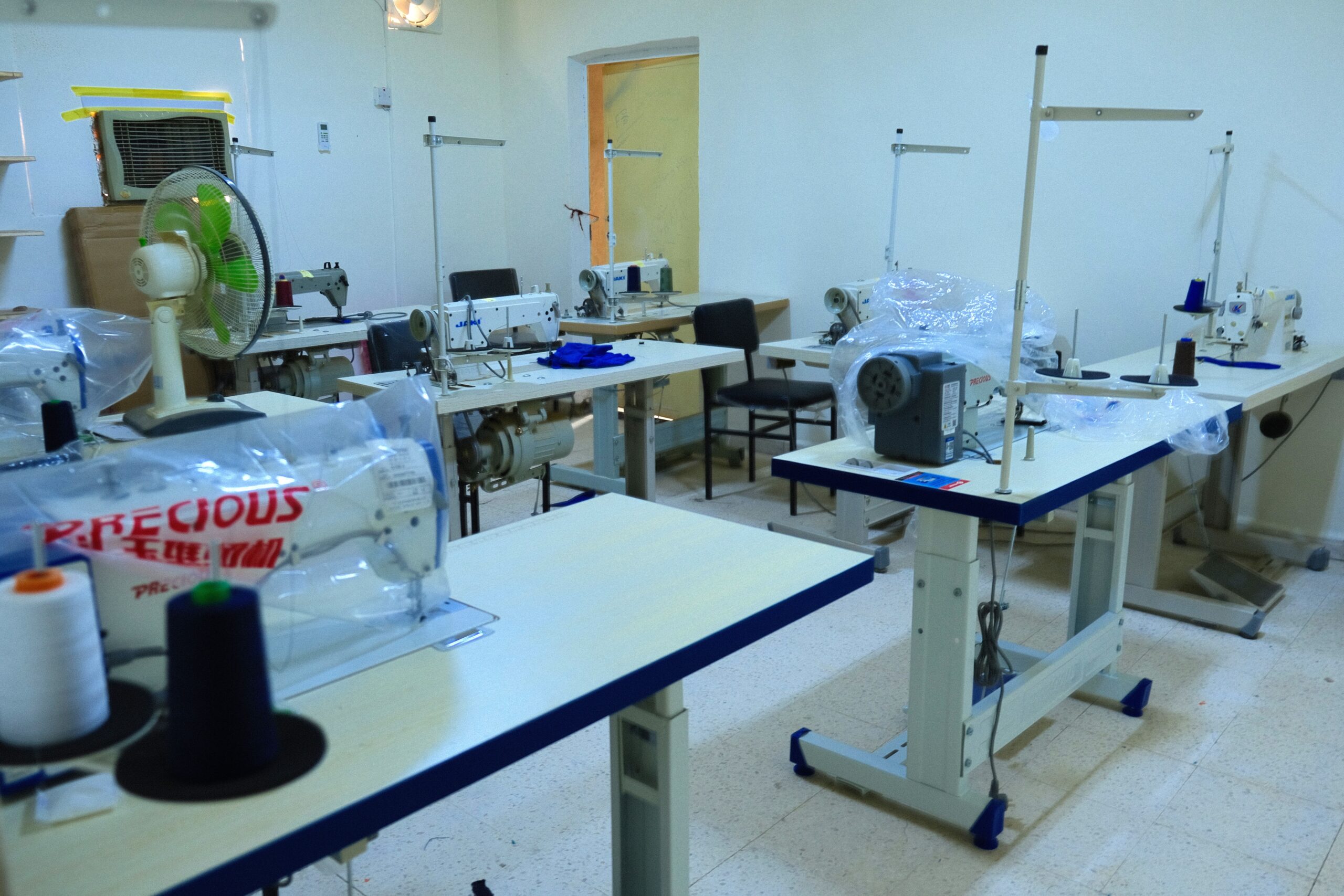
Expanding the Impact
Frequent sandstorms, difficult weather conditions, and resulting power cuts were other challenges in Wadi Rum. To address this, Qutnah helped families and businesses secure interest-free loans to install 210 solar panels, benefitting both tourist camps and homes.
Education is also a priority for Qutnah. As many families in the area struggle to pay for their children’s higher education, she provided 500 JD loans to young people in the community to help them attend university. These loans could be repaid whenever the students found work after graduation.
The association also began educating parents on children’s health and the importance of creating safe, nurturing environments, with a special focus on the psychological well-being of displaced children, such as Syrian refugees.
Qutnah expanded the association’s impact by training women to cultivate endangered medicinal and natural plants in greenhouses, promoting both environmental sustainability and income generation. A highlight of these efforts was the Ghada Festival, held under the patronage of Princess Basma bint Ali, which raised awareness about the cultivation and preservation of endangered plants.
In 2023, the association welcomed a visit from the King and Queen of Jordan, who funded the construction of a new building featuring a large kitchen and a pottery workshop where tourists can learn traditional cooking and pottery-making skills.
The association’s reach extended beyond the local community. After the wars in Syria and Yemen, Qutnah and her team supported refugees, ensuring the Disi Women’s Association remained a vital resource for those in need.
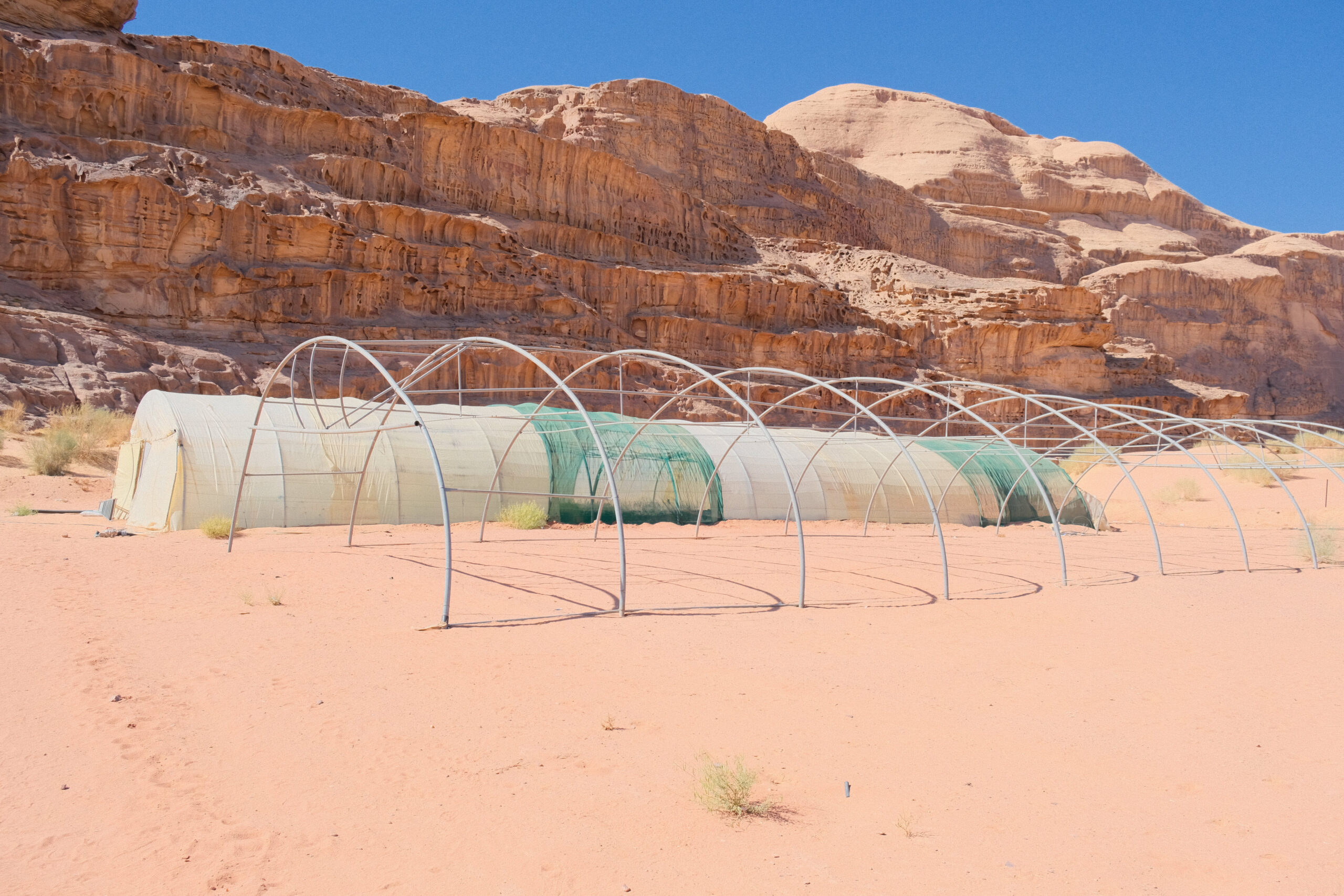
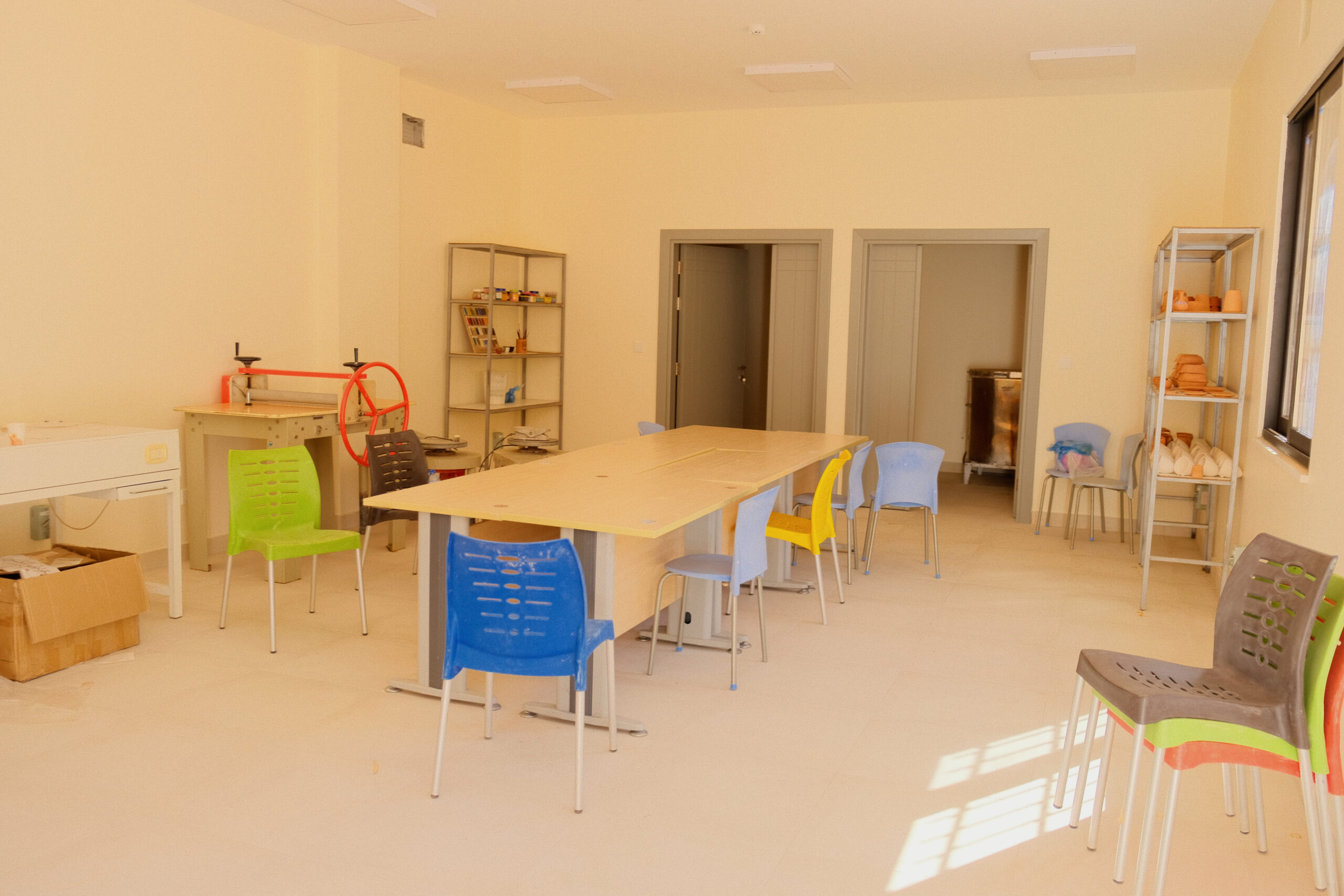
Personal Reflections
When I ask Qutnah how she managed to achieve so much while raising a family, she laughs. She says that studying at university in Amman was only possible because her parents allowed and supported her studies. For the success of her association, she credits her husband, who holds an influential position in a government ministry, for his support during the association’s early days. Still, she admits it wasn’t always easy. At times, her children felt the association took her away from them, but she knew her work was making a lasting difference.
Qutnah reflects on her journey, sharing a moving memory from her time at university in Amman. Many people there told her that Bedouins do not give women any opportunities to succeed. Their words saddened her, but instead of giving up, she resolved to prove them wrong. At the time, most Bedouin women were married between the ages of 14 and 17. While her family supported her education, her mother occasionally reminded her to think about marriage. Her youngest sister even got married while Qutnah was in her first year at university. However, Qutnah was determined to finish her studies first. Today, she notes that men’s attitudes have changed. The age at which women get married is less restrictive, and more families prioritize education for their daughters, although it varies from family to family.
Successes and Challenges
I ask Qutnah whether she generally received support from those around her or if she faced backlash and criticism.
She says that in the beginning, some people were suspicious of her project, but she “gained their trust over time and with increasing activity.”
Samah, the translator, laughs and turns to me: “I assure you that EVERYONE here trusts Qutnah!” It’s usually the fathers and brothers who bring their wives and sisters to the association. They saw that Qutnah was enabling women to create their own projects and small businesses, generating additional income for their families. These visible results made them change their minds, and now all of them trust Qutnah and bring their women to the association.
When I ask Qutnah if she had any difficult moments during the establishment of the association, she recalls one particularly challenging time when she submitted her first project proposal for a pottery workshop to USAID. She went to their office, where the staff looked at her proposal and dismissively said, “This is nothing!” It was the first time Qutnah had submitted an official project proposal to an international organization. They told her she had one week to revise the proposal. Heartbroken, she cried after leaving the office. But instead of giving up, she rewrote the proposal in just three days, returned to the office, and presented a much better version. The staff looked at her proposal in surprise, made some phone calls, and – just like that – the project was approved! The association received 45,000 JD to fund the pottery workshop. These few days had been very tough for Qutnah, but now she can just laugh about it.
Even after the association was well established, the challenges did not end. Sometimes, women arrived home after training sessions feeling very tired. This caused their husbands to discourage them from attending further sessions. So, Qutnah personally visited these men, explaining the importance of the association and how it helped families financially. She even invited them to visit the center to see it firsthand.
A Lasting Legacy
Qutnah’s phone rings, signaling that our time is coming to an end.
“What makes you happy?”, I ask her.
Qutnah smiles and replies, “I’m happy when I can give some money to poor or unemployed people in my community at the end of the month. I’m happy when I see my children and grandchildren happy and thriving. And I’m happy when I get the opportunity to travel.”
As our conversation wraps up, I pose one final question: “What are your dreams for the future?”
For her children, Qutnah hopes that they will continue to live together and work as a team. She wishes for a grandchild from one of her sons, who has been married for six years but has not yet had children.
For her association, she envisions more and more women contributing to its growth and success, as well as forming collaborations with international organizations to broaden its impact.
And for the world, Qutnah’s deepest wish is peace. It pains her to witness the suffering of women and children in the presence of war. She hopes that people from all walks of life and all religions can coexist peacefully.
Qutnah turns to Samah, the translator – a young Bedouin woman from Al-Disah who is currently pursuing her master’s degree at the University of Ma’an. Samah has been part of the association since she was 14 years old. With a proud look, Qutnah says, “I see in Samah a future leader for the association’s projects, like the ‘Badawiyat’ initiative, which supports in-home businesses for 76 women from Wadi Rum.”
Samah smiles and, turning to me, adds, “Qutnah has always been supporting and encouraging me a lot – just like a mother.”
